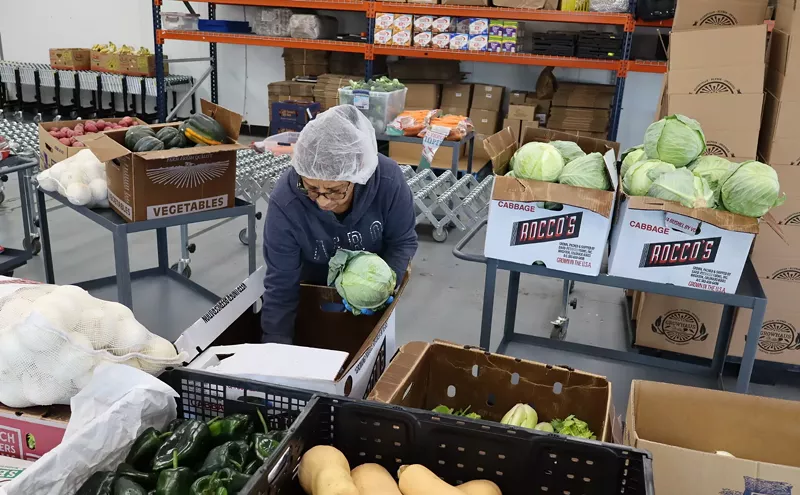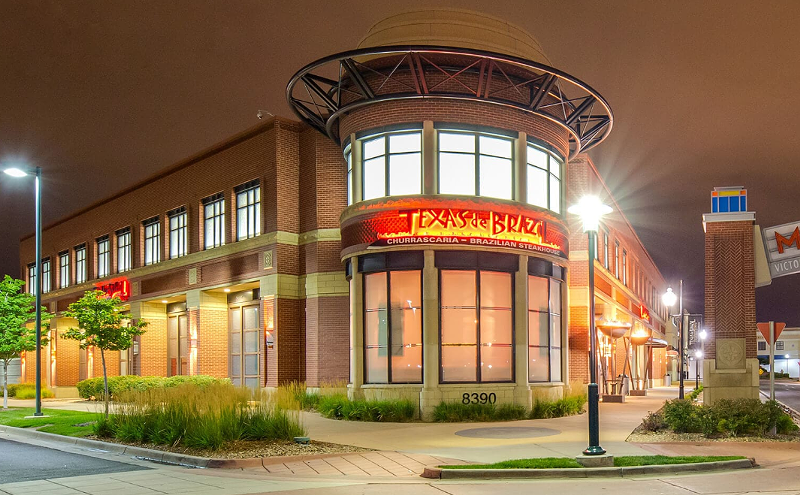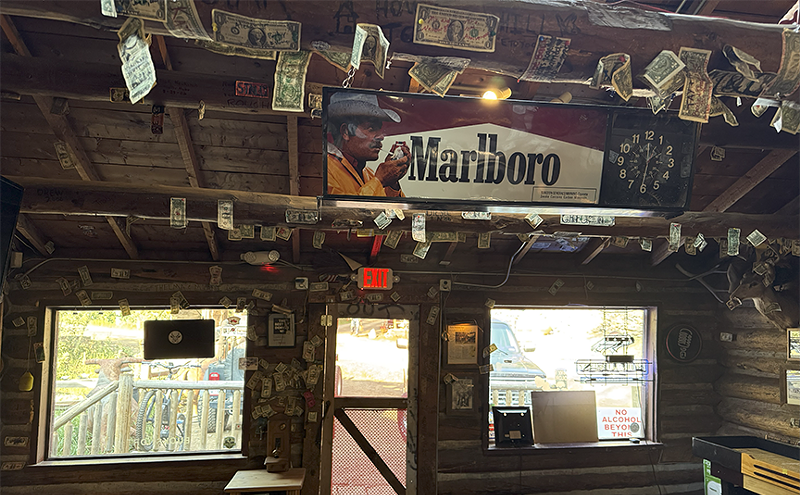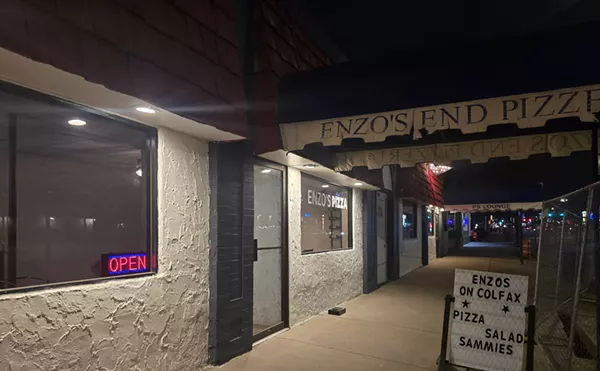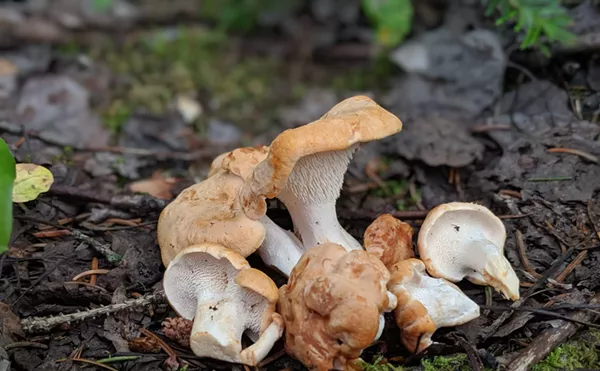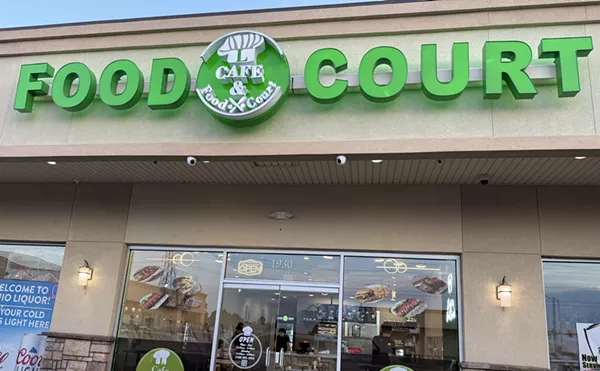Don Quijote is one such blast from the past, one of those restaurants that, when you mention its name, gets responses like, "Oh, yeah, we used to go there all the time."
Maybe it's time to go back.
The crumbling old building on Federal Boulevard probably hasn't changed much in the nearly thirty years that Don Quijote has been in business. Certainly the comfortingly tacky decor is close to the original: fading handkerchiefs depicting various aspects of bullfighting, hand-carved wooden signs with such poignant messages in English and Spanish as "Be good and don't look for approval" and "Man proposes, God disposes." There's more modern bric-a-brac, too: Plastic needlepoint napkin holders and hand-stitched pot holders are offered for sale in a display case, and above the kitchen doorway hangs a stuffed, heart-shaped pillow that proclaims "Love is forever."
But it could be Don Quijote that's forever. Jose Calvos and his wife, Maria, left Mexico in 1968 and came to Denver, where they were among the first to serve Mexican food on the west side of town. Since Jose was originally from Santiago, Spain, they also served some Spanish specialties, and Jose quickly became known for his paella, an authentic Valenciana version that still has to be ordered a day in advance ($60 for four people). And it's still wonderful, with chicken, shrimp and sausage in creamy, perfectly separated rice bright with saffron coloring and flavor.
Although the recipe's the same, the paella isn't made by Jose Senior anymore--although you can still see him preparing the dish for a Channel 6 show in the Sixties, captured in a series of black-and-white photographs on Don Quijote's walls. Jose retired a few years back, and now Maria's joined in the kitchen by her sons Alex and Carlos, while a third son, Jose, runs the front of the house. Maria, who was born in Mexico, spent twenty years working in a French restaurant in Mexico City before she moved to Denver with Jose. That experience goes a long way toward explaining Don Quijote's intricate sauces, which are complex and multi-layered even for such lowly meats as ham hocks and skirt steak.
Most of the food coming out of Don Quijote's kitchen is done Mexican-style (albeit with an occasional French accent), with a few Spanish dishes thrown in; some items are available prepared in either country's style. But I don't know any nation that would want to claim responsibility for the fried-squid appetizer ($5 at lunch). Although it's always tempting to try to discover an unexpected gem at a restaurant, this wasn't it. In fact, we quickly wished we could undiscover the squid and make it disappear altogether. The lightly dusted, deep-fried rings and tentacles stunk of bad fish--old, previously frozen fish that someone had found buried in the depths of a freezer. Patrons around us in the non-smoking dining room--a step up from the main eating area, it's a completely separate, enclosed and not-well-ventilated space--kept turning around, looking at us and sniffing. The smell was so bad that we finally got the waitress to take the offending dish away. (She also took it off the bill.)
Other than the stinky squid, though, the rest of Don Quijote's dishes were all keepers. The pollo con mole poblano ($8) featured one of those involved sauces--a semi-smooth puree of onions, garlic, poblanos and pumpkin seeds. If it also contained chocolate, it was impossible to tell, which is the way it should be. (If you can taste bitter chocolate in mole, then the chances are good it's cheap American chocolate, not the real Mexican kind that adds richness but no sweetness or acrid flavor.) Awash in this splendid sauce was a chicken breast--still on the bone, unfortunately, which made the bird a bit unwieldy to handle. Since an underlying puddle of refried beans had pushed the mole into a dangerous meniscus, it was almost impossible to remove the meat from the bone without sending a bucket's worth of mole over the side of the plate and onto white dress shirts.
Less daunting--but less delicious--were the salad and soup (a healthy, filling and ultimately forgettable lentil concoction) included with the entree. The chicken was also sided by the usual annatto-colored rice and, of course, those refried beans. The beans are so ubiquitous that I imagine that somewhere in Denver there must be a building with a huge tube coming out of the side, where every morning cooks from Mexican kitchens line up to squeeze out their daily needs.
But those were the only typical trappings we encountered at Don Quijote. The kitchen does an atypical job even on Mexican standards. To test this, we ordered a combination plate--and Don Quijote passed the test with flying colors and flavors. The chile relleno, burrito y enchilada combinaciones ($5) included a soft-fried chile stuffed with Jack cheese, a normal-sized burrito of refried beans, rice and chicken, and a cheese enchilada sparked brilliantly by fresh chopped onions. Everything was evenly covered--not drowned, not saturated--with Don Quijote's greaseless green chile, a tomato-studded version imbued with pork and thick with jalapenos. No cheap orange cheese, no oily slick, no flour-thickened base: It added up to lots of good, clean-tasting Mexican food.
Even the flan ($1.50) was an excellent take on an old standard, a yolk-heavy square obviously cut from a sheet cake of custard, all wobbly and well-sweetened with caramel glaze.
The second time around, we wanted to find out if Don Quijote did as well with Spanish dishes as it did with Mexican. But first we returned south of the border, plunging tortilla chips into warm, mildly spicy chile--a welcome break from the usual salsa fresca--and freshly mashed, chunky guacamole that was lemony, slightly salty and light on the onion. This was great guac, without the lawn of cilantro and graying squishiness you find at so many Mexican restaurants around town.
Then we knuckled under and got down to some serious eating: chamorro a la Espanola ($10), ham hocks cooked Spanish-style. A ham-juice-heavy sauce dripped from a huge pig ankle that definitely was not from the poorly-smoked-badly-frozen section of the supermarket. Instead, the succulent meat was literally falling off the bone, right into more of the condensed juices and a scattering of peas, beans and chunks of roasted tomato.
We'd also ordered the pescado al Pimpil ($9), mainly so that we could say, "We'll have the pimple fish." But the joke was on us, because the thick halibut steak was terrific, submerged in a broth enhanced with garlic and cilantro. The fish had been poached in the liquid to a soft, flaky medium-rare, and the broth was so good we ate it like soup (which was preferable to eating the lentil concoction, which apparently is the soup of every day). Although our waitress had told us that Pimpil is the name of a Spanish town, Jose Calvos says it's the name of that exquisite sauce; whatever, I'll never look at Clearasil the same way.
Like its namesake, this restaurant is doing battle, too: Don Quijote is fighting for its share of Denver diners. It's ironic that two of the hottest trends--those Mexican grills and tapas menus--are feeding off of two countries' cuisines that this old warhorse has already conquered. Don Quijote could teach those new kids a few things. In fact, more mature kitchens around town could use a refresher course here on how to stop doing Mexican food the same old lazy way.
At Don Quijote, a great meal is no impossible dream.
Don Quijote, 35 Federal Boulevard, 934-9753. Hours: 10:30 a.m.-9 p.m. Tuesday-Thursday; 10:30 a.m.-9:30 p.m. Friday; 9:30 a.m.-9:30 p.m. Saturday; 10:30 a.m.-9 p.m. Sunday.




